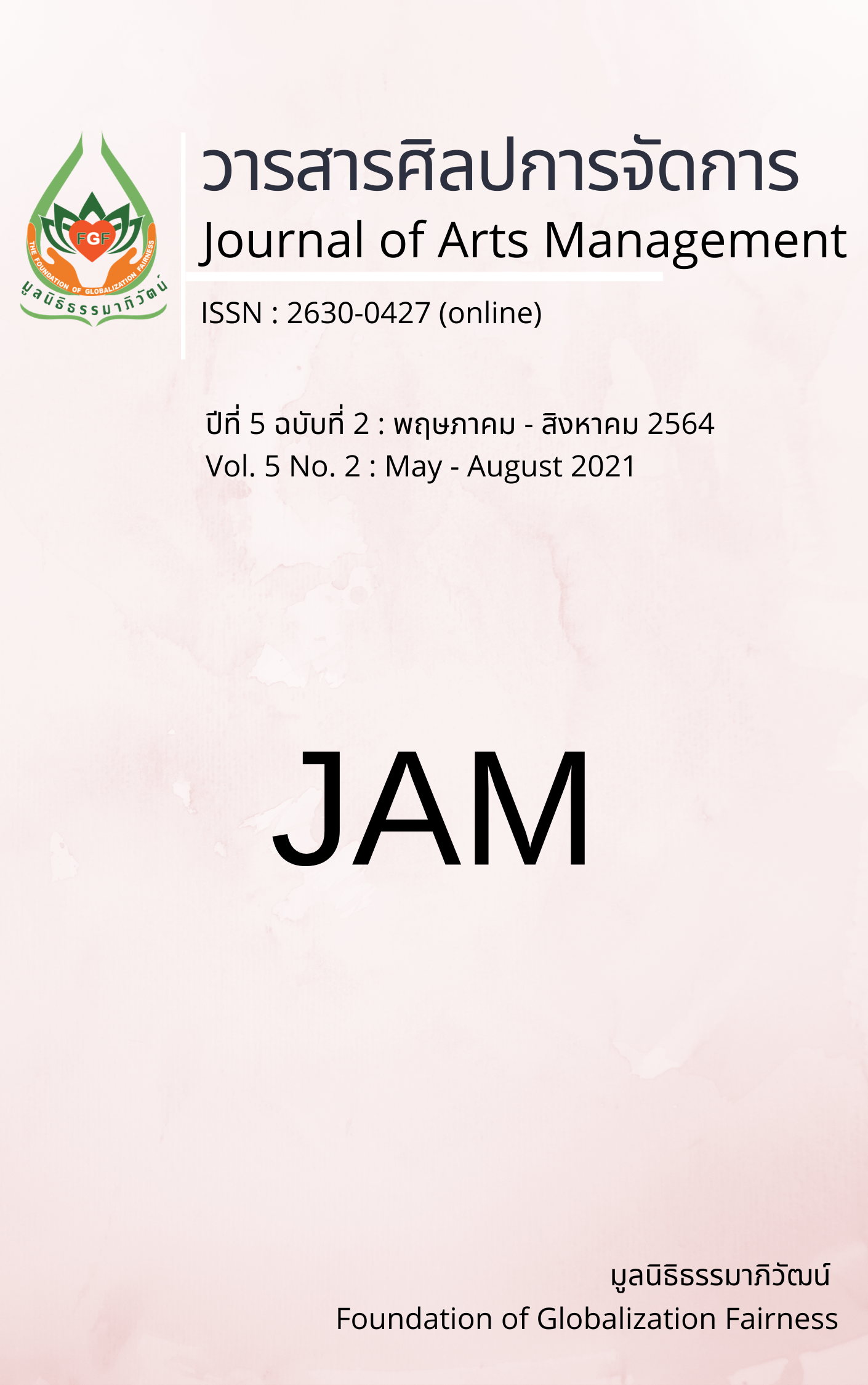Causal Factors Affecting Loyalty for Booking a Room on Airbnb Website of Customers in Thailand
Main Article Content
Abstract
This article aimed 1) to develop and a causal of relationship model of loyalty for booking a room on Airbnb website of customers in Thailand; 2) to study causal factors affecting of loyalty for booking a room on Airbnb website of customers in Thailand. A sample was people who have booked a room on the Airbnb website and at an accommodation in Thailand of 250 people. The tools used in the research were online questionnaires. The statistics used in data analysis were frequency, percentage and structural equation model.
The results of this research were the development of the causal relationship model consisted of 5 components were 1) Website Image 2) Website Quality 3) Satisfaction 4) Value and 5) Loyalty and the model is consistent with the empirical data to a great extent. The statistic showed the Chi-square statistics goodness fit test (2) = 277.95, degrees of freedom (df) = 253, CMIN/df = 1.10, GFI = 0.92, AGFI = 0.90, SRMR = 0.07, RMSEA = 0.02. The final was predictive coefficient = 0.90, indicating that the variables in the model can explain the variance of the loyalty for booking a room on Airbnb website by 90 percent. It was found that causal factors affecting loyalty for booking a room on Airbnb website were Website Image, Website Quality, Value and Satisfaction Respectively. The results of this research for website developer or hotel and homestay operator are utilized to a marketing plan and create marketing strategies that are suitable for customers. Resulting in loyalty for booking a room on website in the future.
Article Details
Views and opinions appearing in articles in the Journal of Arts of Management It is the responsibility of the author of the article. and does not constitute the view and responsibility of the editorial team I agree that the article is copyright of the Arts and Management Journal.
References
กนกวรรณ์ โสภักดี และ ธีระวัฒน์ จันทึก (2559). ปัจจัยความคาดหวังที่ส่งผลต่อพฤติกรรมการเลือกจองห้องพักในระบบอิเล็กทรอนิกส์บนเว็บไซต์. Veridian E-Journal, Silpakorn University, 9(2), 358-374.
กระทรวงการท่องเที่ยวและกีฬา. (2561). สถิติด้านการท่องเที่ยว ปี 2561 (Tourism Statistics 2018). สืบค้นเมื่อ 12 กุมภาพันธ์ 2564, จาก https://www.mots.go.th/more_news_new.php?cid=497
กริช แรงสูงเนิน. (2554). การวิเคราะห์ปัจจัยด้วย SPSS และ AMOS เพื่อการวิจัย. กรุงเทพฯ: ซีเอ็ดยูเคชั่น.
จุฬาลักษณ์ เทียนรุ่งรัศมี, ปรัชญา แก้วแก่น และ ปริญญา เรืองทิพย์. (2559). ปัจจัยเชิงสาเหตุที่ส่งผลต่อความภักดีของผู้รับบริการการแพทย์แผนไทยในภาคตะวันออกของประเทศไทย. วารสารสาธารณสุขมหาวิทยาลัยบูรพา, 12(1), 22-28.
เทพภิภพ พลม่วง. (2557). การรับรู้ภาพลักษณ์และความพึงพอใจในการสื่อสารของผู้รับบริการต่อศูนย์การแพทย์สมเด็จพระเทพรัตนราชสุดาฯ สยามบรมราชกุมารี คณะแพทยศาสตร์ มหาวิทยาลัยศรีนครินทรวิโรฒ(วิทยานิพนธ์นิเทศศาสตรมหาบัณฑิต). มหาวิทยาลัยธุรกิจบัณฑิตย์.
ประชาชาติธุรกิจ. (2564). เปิดวิจัยผลกระทบ “โควิด” กับทิศทาง “ท่องเที่ยว” ในอนาคต. สืบค้นเมื่อ 2 พฤษภาคม 2564, จาก https://www.prachachat.net/tourism/news-659616
มงคล หาญวีระ. (2560). ปัจจัยที่มีผลต่อความจงรักภักดีของลูกค้าต่อแบรนด์รถยนต์ใหม่จากประเทศจีน(วิทยานิพนธ์วิทยาศาสตรมหาบัณฑิต). มหาวิทยาลัยธรรมศาสตร์.
วรันพร นางาม. (2561). อิทธิพลของปัจจัยเชิงสาเหตุที่ส่งผลต่อความตั้งใจซื้อซ้ำอาหารคลีนของผู้บริโภคในเขตกรุงเทพมหานคร(วิทยานิพนธ์บริหารธุรกิจมหาบัณฑิต). มหาวิทยาลัยเทคโนโลยีราชมงคลกรุงเทพ.
วีระวุฒิ จงวัฒนมนตรี. (2558). ปัจจัยที่มีผลต่อการตัดสินใจเข้าพักห้องพักแบบที่มีคนท้องถิ่นเป็นเจ้าของห้องพัก (AIRBNB)(การค้นคว้าอิสระบริหารธุรกิจมหาบัณฑิต). มหาวิทยาลัยธรรมศาสตร์.
สุภัชชา วิทยาคง. (2559). ปัจจัยที่ส่งผลต่อความภักดีต่อตราสินค้าของสายการบินต้นทุนต่ำของผู้ใช้บริการชาวไทย(การค้นคว้าอิสระบริหารธุรกิจมหาบัณฑิต). มหาวิทยาลัยธรรมศาสตร์.
แสงเดือน วนิชดำรงศักดิ์. (2555). การรับรู้ภาพลักษณ์และคุณภาพบริการ: กรณีศึกษาธนาคารเกียรตินาคิน สาขากรุงเทพมหานครและปริมณฑล(การค้นคว้าอิสระบริหารธุรกิจมหาบัณฑิต). มหาวิทยาลัยเทคโนโลยีราชมงคลธัญบุรี.
สำนักงานพัฒนาธุรกรรมทางอิเล็กทรอนิกส์, กระทรวงดิจิทัลเพื่อเศรษฐกิจและสังคม. (2563). รายงานผลการสำรวจพฤติกรรมผู้ใช้อินเทอร์เน็ตในประเทศไทย ปี 2562 (Thailand Internet User Behavior 2019). กรุงเทพฯ: สำนักงานพัฒนาธุรกรรมทางเล็กทรอนิกส์, กระทรวงดิจิทัลเพื่อเศรษฐกิจและสังคม.
อรวรรณ กิตติศัพท์กุล. (2559). ปัจจัยที่มีผลต่อความพึงพอใจและความจงรักภักดีของลูกค้าที่ใช้บริการอินเทอร์เน็ตความเร็วสูง (บรอดแบนด์): กรณีศึกษาผู้ให้บริการโทรคมนาคมภาครัฐ(วิทยานิพนธ์วิทยาศาสตรมหาบัณฑิต). มหาวิทยาลัยธรรมศาสตร์.
อัมพล ชูสนุก, จอมพล เวชการ, ฉวีวรรณ ชูสนุก และ กิตติ เจริญพรพานิชกุล. (2560). อิทธิพลของการรับรู้คุณค่าด้านราคา และด้านคุณภาพต่อความไว้วางใจ ความพึงพอใจ การบอกต่อ และการกลับมาซื้อซ้ำของผู้บริโภคสินค้าไทยกูลิโกะในเขตกรุงเทพมหานคร. วารสารบริหารธุรกิจศรีนครินทรวิโรฒ, 8(1), 13-26.
LAN BEI และ จรัญญา ปานเจริญ. (2556). ความสมพันธ์ ระหว่างคุณภาพของเว็บไซต์ความไววางใจกับความภักดีต่อ Application เถาเป่า ของผู้บริโภคในประเทศจีน. วารสารบัณฑิตวิทยาลัย มหาวิทยาลัยธุรกิจบัณฑิต, 8(3), 119-127.
Hoelter, J. W. (1983). The Analysis of Covariance Structures: Goodness-of-fit Indices. Sociological Methods and Research, 11(3), 325–344.
Janita, M. S., & Miranda, F. J. (2013). The Antecedents of Client Loyalty in Business-to-Business(B2B) Electronic Marketplaces. Industrial Marketing Management, 42(5), 814-823.
Kline, R. B. (2011). Principles and Practice of Structural Equation Modeling. (3rd ed.). New York: The Guilford Press.
Talty, A. (2015). Hottest Travel Trends For 2015. สืบค้นเมื่อ 12 กุมภาพันธ์ 2564, จาก https://www.forbes.com/sites/alexandratalty/2014/11/07/hottest-travel-trends-for-2015/?sh=2896ea067c5f


